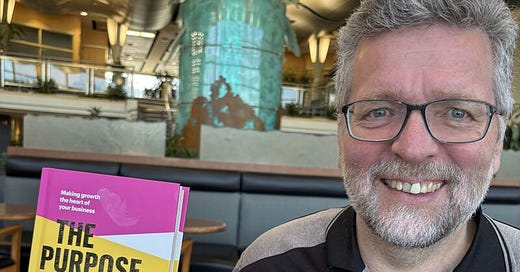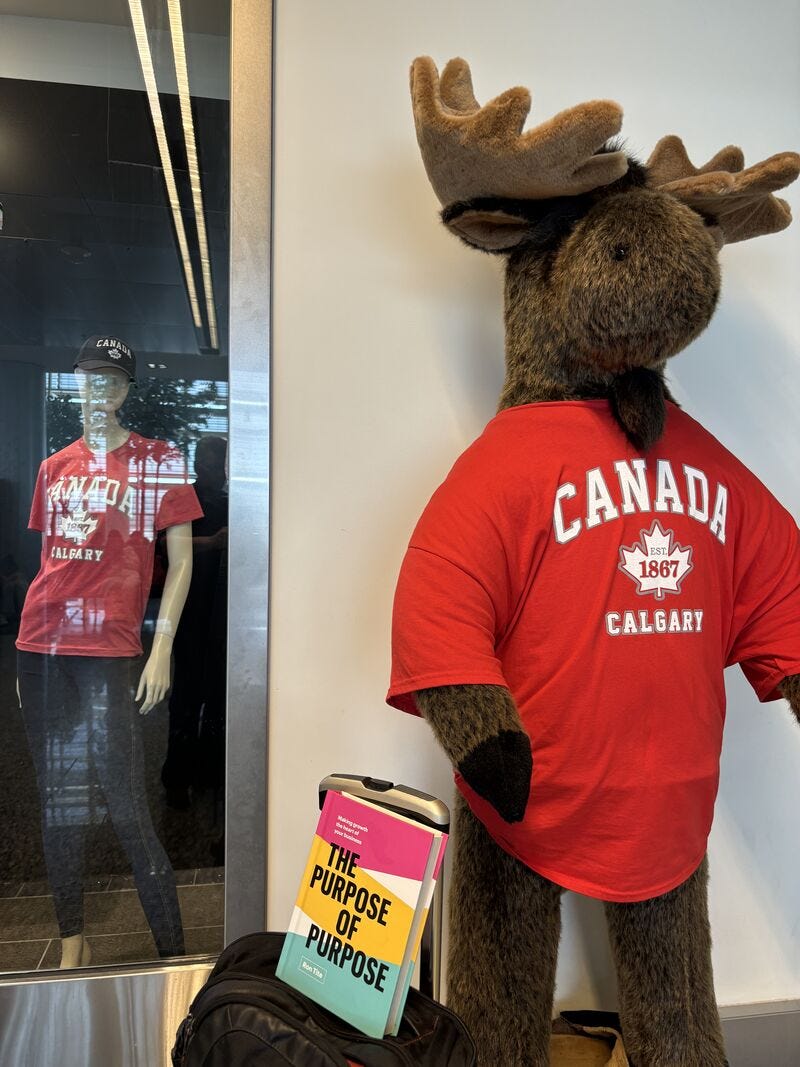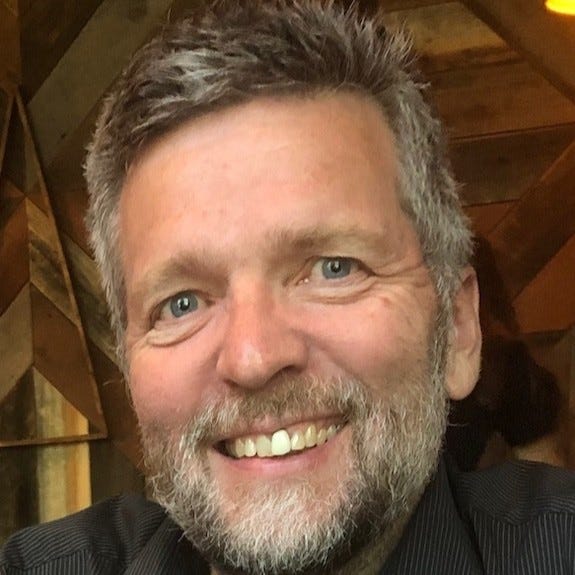It’s not just because I’m Canadian, but I’m starting this week’s newsletter off with not one, but two, apologies.
First, I’m sorry that your inbox has been without updates from me for the past few weeks.
Second, I’m sorry, and please be forewarned that this will be a long post. Longer than your email probably likes and even longer than the average long post here on Substack.
If you follow me on Notes, you’ll also be able to see each section separately there.
That said, I hope you’ll enjoy the inspiration I received from Ron Tite’s recent book, The Purpose of Purpose!
I have followed Ron Tite on LinkedIn for a few years and enjoy his daily posts. In April, I experienced him live as the opening keynote speaker at the British Columbia Hotel Association Summit. A former standup comedian turned marketing and advertising executive, his combination of humour and insight is second to none.
When his book, The Purpose of Purpose was published, I purchased it to read on my trip to Georgia, the country. It was perfect reading for my multiple long-haul flights.
While reading it, each chapter inspired me and brought back relatable memories from my own basement to boardroom career in hotels.
Chapter 1 - Be Like Bo
I read this chapter on the first leg of my trip, a one-hour flight from Kelowna to Calgary.
As feared, I wasn’t able to let the book lie during the first, and shortest, of my three flights, but in an unbelievable show of self-discipline, I limited my reading to Chapter One - Be Like Bo. Here are my key thoughts and three takeaways.
My first impression is that this book will contain countless nuggets of wisdom that will be worth remembering. I’m taking notes because my memory isn’t what it once was, and I might steal a few for future use.
1. I need to Google this Bo Burnham guy, and I probably need to subscribe to his YouTube channel.
2. What is worse, The Great Resignation or The Great Resignation? (That’s not written in error. Is the great resignation that started during the pandemic worse than the great resignation, which consists of many more people who are simply resigned to doing what they always do?
3. Mr. Tite was someone I held in high regard until I learned that his childhood bedroom wall was papered with posters of Ken Dryden, that evil person who kept winning Stanley Cups for the Montreal Canadiens by keeping pucks out of his net in the 70s. (It’s a Canadian thing)
Chapter 2 - It’s the end of the world as we know it (and I don’t feel fine)
I only read one chapter of The Purpose of Purpose on the plane despite the eight hour flight from Calgary to Amsterdam. Chapter two was a doozy full of thought provoking quotes.
My favourite was :
“The Middle Finger is Up. And it’s not coming down anytime soon.”
(That’s Ron Tite’s salute, pun partly intended, to the state of capitalism.)
This chapter also contains a revelation: Ron Tite, author of multiple books on business leadership, doesn’t have an MBA. That gets him a gold star in my book!
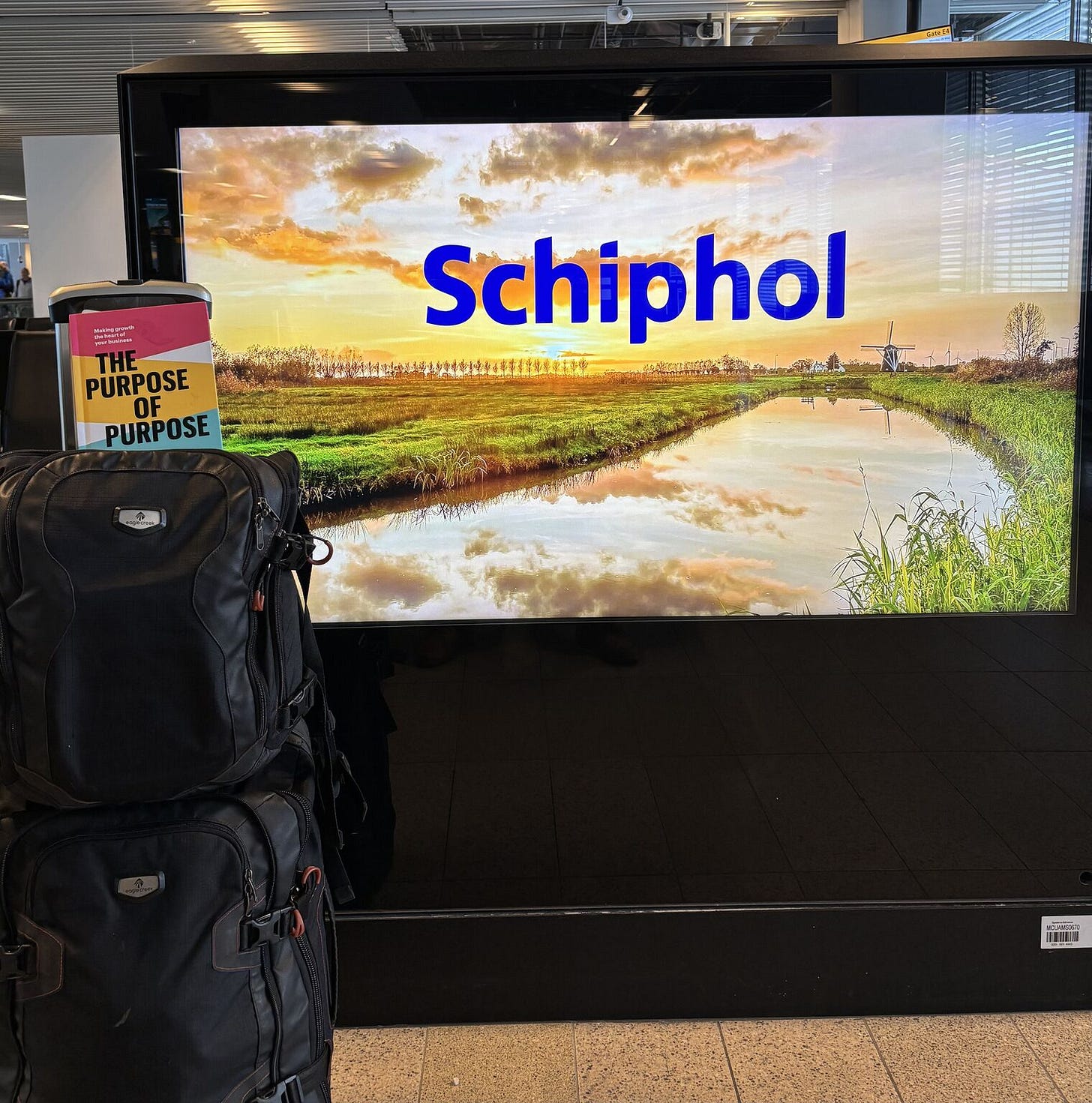
Chapter 3 - Now what? Growth’s what!
and
Chapter 4 - Think, Do, Say, Grow
On my first night in Tbilisi, I couldn’t figure out if there was anything good on TV. Fortunately, I had a good, excellent actually, book to read.
I loved this quote from chapter three:
“Leadership is taking specific actions with the information you have before you to improve the lives of those around you.”
Ron’s revelation in chapter four was that he confessed to not being a handyman.
Yay, we have something in common!
I’m improving, though. After a mere two years and five months of procrastination and deliberation, I recently replaced the torn screen on our deck door.
Yes, it took an entire day, two trips to Canadian Tire, 4862 swear words, and I was sore for days after all the rolling around on the patio, but I did it. (With a certain amount of assistance from my wife.)
Chapter 5 - Focused by purpose (The Think Part)
Great title, because this chapter made me think.
An example from the book states:
In 2019, 180 CEOs representing 35% of the US Market Cap signed a statement declaring that companies should serve not only shareholders, but also customers, employees, suppliers, and communities.
That made me think:
1) We need a statement for that?
2) How many of those CEOs have since scrapped DEI post-2025 inauguration?
(FYI, ChatGPT’s take on #2: “Many companies now seem to favour short-term political appeasement over the stakeholder-centred purpose they pledged to uphold.”)
At breakfast on Day 1 in Tbilisi, I overheard a group of Western European expats. They loudly complained about local border guards, late business start times, and police with lights always flashing. They viewed it all as “incompetence” and spoke in derogatory terms about the country they were guests in and going to do business in.
Their smug superiority reminded me of similar people I had overheard when travelling for work during my corporate career.
I wondered about the breakfast club:
What is their company’s purpose? Is it so well-written that it could bring Ron Tite to tears and then turn those tears to rage from how disconnected it is from the reality of their business?
When I used to visit hotel projects in Eastern Europe, the Middle East, and Asia, I always tried to learn about how different teams, with different resources and challenges, solved problems creatively. My department’s role was to inspect and educate, but we always brought back ideas that helped us support our hotels better.
Maybe that’s why moving to Canada in 2018 felt like stepping back to 1987. Like those expats, too many people in the Western world seem content to judge other countries instead of finding things we can learn from them.
Chapter 5 had me thinking so much that I walked 13 km through Tbilisi before lunch. 19000 steps according to my phone.
I was grateful to my hosts for giving me a day to acclimate after 20 hours of travel the day before.
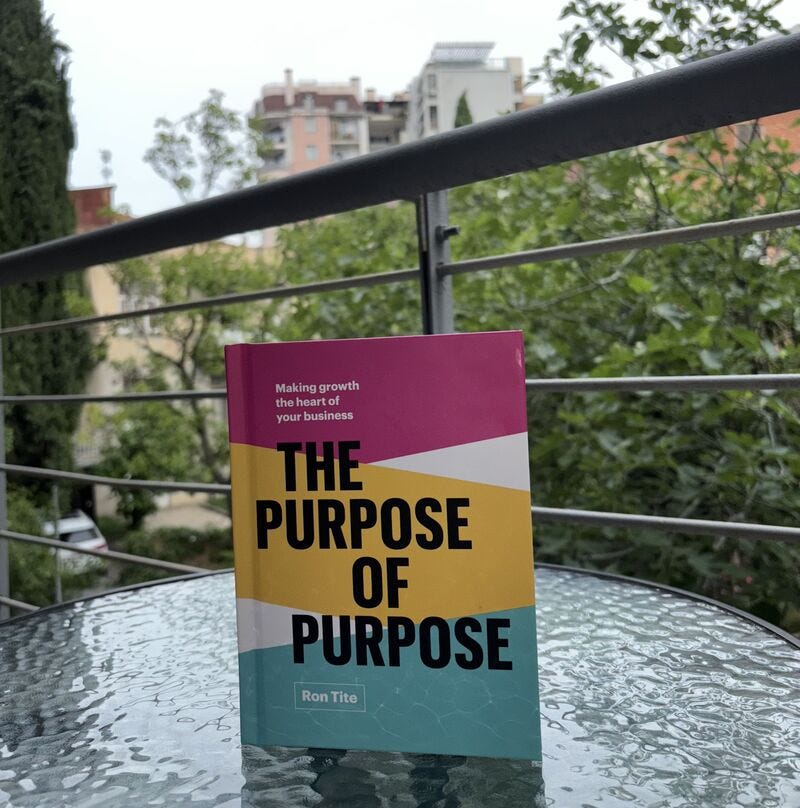
Chapter 6 - The do part (Define Your Actions)
6 days, 3 cities, 9 workshops, 150 hoteliers.
That was the schedule UN Migration had set up for me. Once we began the workshops, my only day off was a Sunday between workshops 7 and 8. I spent the day walking Batumi’s boardwalk and was too tired to read when I got back to the hotel.
The workshops on human trafficking raised awareness in hotels in Georgia. Reading had to wait until I began my journey home.
When I finally had a chance to peek at Chapter 6, it fit perfectly into one of the messages workshop participants had received.
Georgia, like Canada, has laws, regulations, and standards governing human trafficking. They comply with relevant international standards.
Yet, trafficking in persons exists there, as it does in Canada.
Willingly or unwillingly, hotels are often facilitators of trafficking.
Laws and standards don’t stop trafficking. Behaviour does.
For example, traffic laws don’t stop people from running red lights. Drivers’ behaviour, i.e. pushing the brake pedal, makes the car stop.
Even when laws and regulations are in place to make horrific crimes illegal, nothing happens unless people act and change their behaviour.
Last year, Canadian provincial hotel associations made bold announcements proclaiming that they were going to collaborate to reduce the risk of hotels being facilitators of human trafficking.
An online training program was created.
How many hotel staff have completed the training?
How much has behaviour changed?
Just like laws and regulations don’t automatically change something for the better, press releases don’t either.
Will Canadian hotels follow the lead hotels in Georgia have taken?
Are they ready for the “Do” part of their well-intended collaboration?
Have they defined their actions?

Chapter 7 - Adopted through communication (The Say Part)
In this chapter, Ron Tite emphasized that purpose needs to be clear to be understood, it needs to be repeated to be remembered, and it needs to be believed to become a part of your culture and identity.
In his book, The Rise of Security and Why We Always Want More, Mike Croll credited me with potentially contributing to making the email sign-off, Stay safe, popular in the 90s. He backed it up with data from Google that allegedly showed that the phrase became increasingly common in the 90s when email became the communication tool of the day.
I doubt that I had much to do with the trend, but I’ll admit that it was fun to be mentioned in Mike’s book.
I started using “Stay safe” as my sign-off when I remembered that my Grade Eleven English teacher, Mr. O’Donnell, taught us how advertising allegedly used subliminal messaging. I don’t know if it was a provincially approved curriculum in 1977, but Mr. O’Donnell used examples from the book “Subliminal Seduction”.
As the security guy in a growing hotel company, “Stay safe” was my attempt at subliminally seducing everyone I sent emails to so they would stay in our hotels because we provided safe accommodation.
I later added “Always Care” to the sign-off when we made it our corporate security tagline. The tagline was inspired by our legendary CEO Kurt Ritter’s book, in which he introduced the “Triangle of Excellence”. It said we could only be successful if we had happy guests, happy owners, and happy employees.
It’s often a challenge for corporate security to get buy-in from customers, colleagues, and the board. We introduced “Always Care” to say what we believed in a way everyone associated with our company could understand and apply to their own role.
“Care about people, care about property, care about the world around you - Always Care”
I left Radisson seven years ago, but I still use that sign-off. Last year, I was blown away when one of my former colleagues informed me that they had renamed the hotel safety and security self-assessment tool ACT - the Always Care Tool.
Proof that, as Ron Tite reminds us, a purpose only comes to life and creates culture when you Think it, Do it, and Say it.
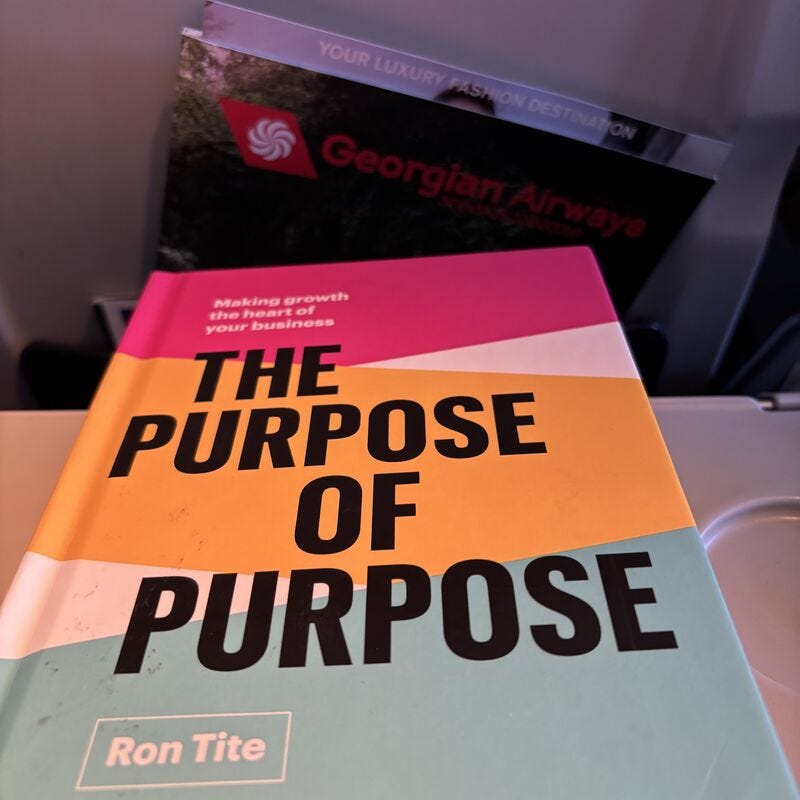
Chapter 8 - Go Forth and Multiply
In the final chapter of The Purpose of Purpose, Ron Tite tells a compelling story about how a virtual kick in the last part of your body to get off a chair inspired him to write an ad for an educational institution.
“We’re all students right now.”, reminded me of the last supper my wife and I enjoyed at a restaurant the evening before the pandemic closed everything down.
We saw the light from the freight train in the tunnel and, knowing that there was no escape from whatever was going to hit us, we decided to spend that evening at Skinny Duke’s Glorious Emporium.
It’s a 70s-themed restaurant where the dining room upstairs is nice, and where downstairs is exactly like some of the basements we partied in when someone’s parents were away. The only difference is that the food is better, and I don’t have to drink vodka and Orange Crush, which is what the only friend who looked old enough to buy booze always bought when we were in high school.
Our server that evening knew she was going to be laid off, but she approached her fate with the mindset of someone who believes that “we are all students”.
“We’re going to experience something no one alive has experienced before. Think how much we’re going to learn!”
The Purpose of Purpose is not as dramatic as a global pandemic, but if you approach it with a “we’re all students mindset,” I guarantee it will be an excellent learning experience!
As I read the final chapter, Amsterdam was still a couple of hours away, but moments before we left Tbilisi, I had learned my onward connection was cancelled.
“Things happen for a reason.”, my wife says.
Best case, I would still be able to kiss Kirsten at Kelowna airport later in the day.
Second best case, if I had to spend the night in the Netherlands, I’d be able to hug our Rotterdam-based daughter.
Stay safe,
Always Care
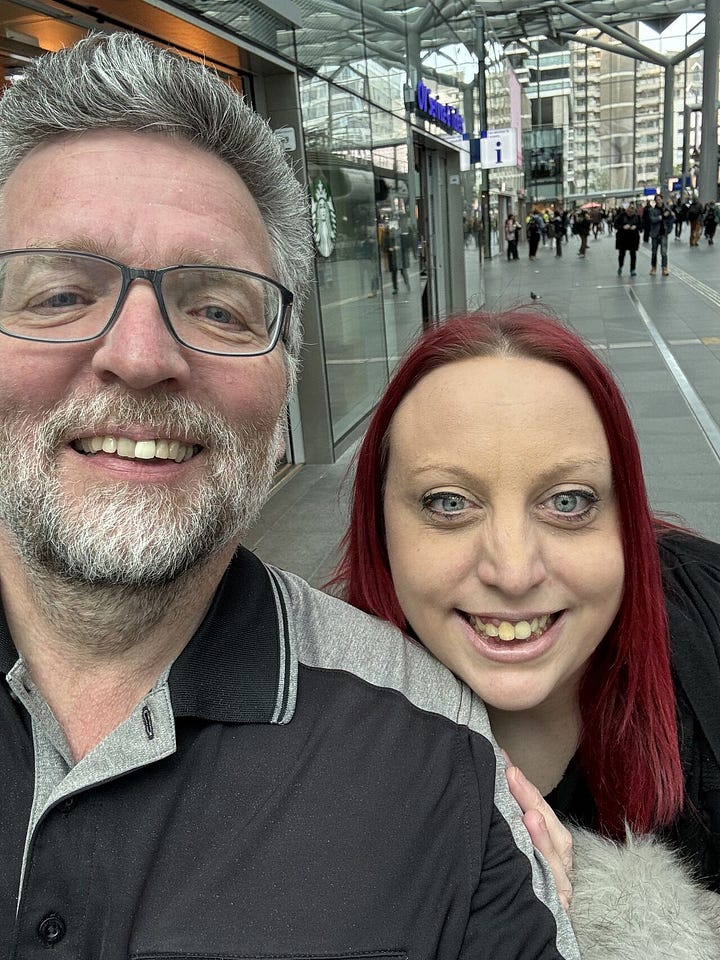

Hi! I’m Paul.
I was born, raised, and currently live in Canada. After high school, I embarked on a gap year in Europe. It lasted four decades. I went to university in Norway and started my hotel career in the basement of a five-star hotel in Oslo. The manager who hired me told me I was too old, too educated, and had too many opinions to be a security guard. He also told me that the only other person who applied for the job didn’t want it.
Thirty years later, I left that same company. It had grown from a small regional hotel chain with twenty-something hotels in Scandinavia to become a large, multi-brand hotel group with over a thousand hotels in almost one hundred countries.
Along the way, I moved from Norway to Denmark to Belgium. Before I left, the company awarded me their highest individual honour for leadership, and security professional peers selected me as the world’s most influential corporate security executive.
I’m a hospitality professional. I’m a security professional. If you ask, I will tell you that security was my job, and hospitality was my business.
Today, I’m an educator and a consultant passionate about hotels, hospitality, and keeping people safe during their travels.
In addition to the Always Care Community, I also write for Risk Resiliency’s Keep Travel Safe. If safe, secure hospitality, hotels, and travel are important to you, please subscribe to KTS!
Written with the clarity of hindsight, the accuracy of a faded memory, and countless creative liberties, the Always Care Community is a newsletter of how life has made me an emigrant, an immigrant, and gifted me experiences I never dreamed possible.
Thanks for reading. Your support is my motivation and I’m genuinely grateful that you’re here. Please share, subscribe, and connect with me.

